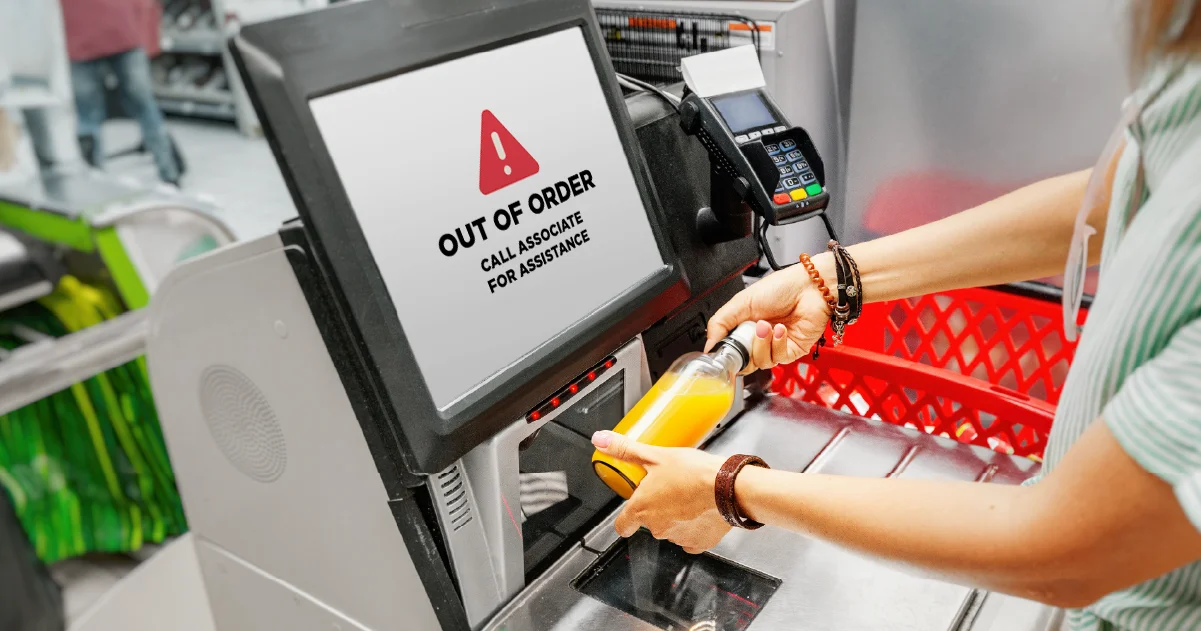
The SOTI report, Techspectations: Consumer Demand for Digital Transformation in Retail, is here and this year we took a deep look into consumer perceptions of the in-store shopping experience.
In 2023, there was anticipation over the store of the future and how technology would make shopping better. In 2024, there’s frustration from consumers regarding the management and security of in-store devices. The speed and convenience of online shopping have not yet arrived in-store. Consumers have noticed and aren’t happy.
Here are three things we learned in Techspectations.
1. Lots of Technology; Not Enough Help with It

Technology should improve in-store shopping. When issues arise, that’s bad. Consumers say the inability to quickly resolve issues worsens the experience.
Below are some of the most popular in-store technologies and the reason why consumers are frustrated with them may or may not surprise you.
| Self-Serve Checkout | Handheld Scanners | POS Devices |
 |
 |
 |
| 69% say there’s not enough staff to help resolve issues | 51% say there’s not enough staff to help resolve issues | 48% say there’s not enough staff to help resolve issues |
Self-Serve Checkout

69% say there’s not enough staff to help resolve issues
Handheld Scanners

51% say there’s not enough staff to help resolve issues
POS Devices

48% say there’s not enough staff to help resolve issues
Globally, 25% of consumers will shop elsewhere for a better in-store technology experience. If you’re a retailer, can you risk losing a quarter of your in-store consumer base because nobody’s around to fix device issues?
- What it means: Retailers invest in technology to enhance the in-store experience. But they’re not investing in the tools needed to ensure functionality and integration with other systems. When technology issues can’t be solved quickly, consumers are willing to take their dollars elsewhere.
2. Consumers Worry About Security

Whether shopping online or with in-store devices, entering personal details is part of the purchase process. While it’s a common thing consumers do in 2024, there’s still a sense of unease.
Below are some of the top concerns consumers have when entering their information:
| Financial Fraud | Identity Fraud | Data Leakage |
 |
 |
 |
| 35% are concerned their financial data will be stolen | 35% are concerned their identity details will be stolen | 26% are worried about the next device user seeing their details |
Financial Fraud

35% are concerned their financial data will be stolen
Identity Fraud

35% are concerned their identity details will be stolen
Data Leakage

26% are worried about the next device user seeing their details
Digital transformation in retail is occurring, but there are still security gaps. Collectively, 76% of consumers have some concern about entering their personal details. Even more troubling is that 32% of global consumers don’t trust retailers to protect their personal and payment data.
- What it means: Consumers crave the speed and convenience offered by in-store technology. But they aren’t willing to sacrifice security for it. If there’s any doubt that a retailer can’t protect data and secure technology, consumers have a powerful option: shop with a retailer who they think can.
3. Supply Chain Problems Persist

The global supply chain crisis hasn’t subsided. There are still issues with connectivity, forecasting and replenishment. Technology should help alleviate these problems, but there are still frustrations consumers are having with the supply chain:
| Item Availability | Ordering Via In-Store Devices | Ordering Via Tablets |
 |
 |
 |
| 40% have been told an item is available and later be told it is out of stock | 40% ordered items using an in-store device and when they went to the checkout, it said goods were out of stock | 41% have used tablets to see reviews and then ordered items using the device to later find they were out of stock |
Item Availability

40% have been told an item is available and later be told it is out of stock
Ordering Via In-Store Devices

40% ordered items using an in-store device and when they went to the checkout, it said goods were out of stock
Ordering Via Tablets

41% have used tablets to see reviews and then ordered items using the device to later find they were out of stock
In-store technology says an item is available. The consumer thinks “great, I’ll order it.” When it’s time to collect it, they’re told it’s out of stock or unavailable. That’s a bad experience as both consumers and store associates don’t know what caused the disconnect or what to do next.
- What it means: Digital transformation in retail doesn’t just occur at the store. It is part of the whole supply chain from warehouses to delivery trucks. The in-store technology retailers invest in must be integrated with other systems to deliver a unified, real-time and accurate consumer experience.
Want to Learn More? Download Your Free Copy Today
These are just some of the insights uncovered by Techspectations: Consumer Demand for Digital Transformation in Retail. Other valuable information includes:
- The one big question consumers have about the in-store shopping experience
- The one piece of information 74% of your consumers expect to always know
- The five new technologies consumers want to see in your stores
Download your copy of Techspectations. It’s fast. It’s free. It’s full of facts and figures to help you deliver the in-store shopping experiences your consumers want.



